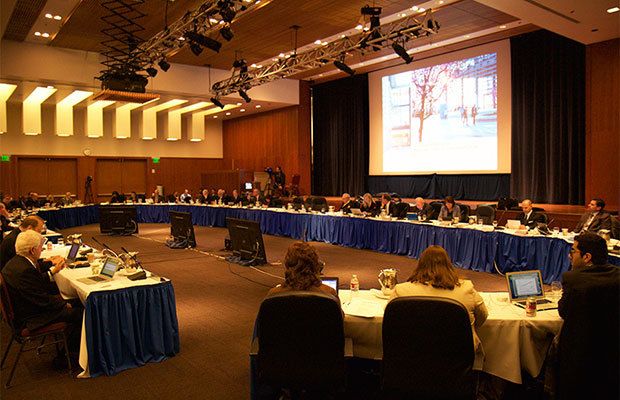3 UC student governments consider bills expressing no confidence in regents, Napolitano

By Michelle Pitcher
Student government officials from UC Berkeley, UCLA and UC Riverside are working to pass bills expressing no confidence in UC President Janet Napolitano and the UC Board of Regents after the board’s approval of a controversial tuition increase policy.
The bill was written collaboratively by student government representatives from each of the three campuses, namely the external vice presidents and Kevin Sabo, a UC Berkeley student who currently serves as board chair for the UC Student Association.
The bill demands the regents repeal the tuition policy and calls for the creation of a committee composed of students, faculty, staff, alumni and administration to conduct an investigation of the UC budget.
The bill also raises concerns about the fact that Napolitano announced the plan to student leaders two weeks before formally presenting the plan to the regents. A 2012 assembly bill requires the university to inform the UC Student Association at least 40 days before mandatory fee increases are introduced, though the bill was not formally adopted by the regents.
Although responses to the regents’ actions were originally discussed by the UC Student Association in an effort to establish student leadership for concerned students, Sabo said grassroots movements have begun on many campuses.
The bill will be presented to the ASUC Senate at Wednesday’s meeting, and a special meeting will likely be called next week to allow the senate to vote before the end of the semester.
Conrad Contreras, external vice president of UCLA’s Undergraduate Students Association Council, submitted the resolution to the council Thursday. It will be discussed and potentially voted on by the council members Tuesday.
“Resolutions and bills don’t really do much without action,” Contreras said. “This is a way to ignite that fire again that we saw with the protests and to inspire and empower the campus. We have a plan moving forward, and we’re not defeated.”
At UC Riverside, the resolution will be reviewed by the Associated Students of UC Riverside’s legislative review committee Tuesday and will be brought to the senate floor Wednesday.
The governor’s current plan is to increase funding to the university by 4 percent per year for the next two academic years, contingent on UC tuition being frozen. This tuition increase, which could be up to 5 percent per year over the next five years, will be either be implemented, lowered or eliminated, depending on levels of state funding.
“The regents didn’t vote on a tuition increase, they voted on a contingency plan,” said UC spokesperson Brooke Converse. “Our hope and our plan is to work with the state to avoid a tuition increase, and we hope that the students can work with the Office of the President to get this done.”
Students at these campuses have a history of expressing discontent with Napolitano’s presidency. Last year, the student governments at all three campuses attempted to pass bills objecting to Napolitano’s appointment, mainly due to concerns about her tenure as secretary of the Department of Homeland Security.
Abraham Sanchez, vice president of external affairs for the Associated Students of UC Riverside, said the current resolution targets the regents and Napolitano as leaders of the university rather than for their previous actions.
Sabo said he understands state funding played a role in the regents’ decision, but students must focus their energy on responding to what they deem a failure by the regents to communicate with students.
“If there is a rolling systemwide movement where campus by campus, like dominoes, a vote of no confidence is passed, then it should send a very clear message to the regents that this is a massive student movement,” Sabo said. “We are not political pawns — we have agency, and we don’t deserve to be sidelined.”
[Source]: Daily Californian


